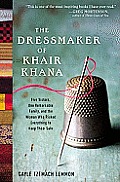The Dressmaker of Khair Khana: Five Sisters, One Remarkable Family, and the Woman Who Risked Everything to Keep Them Safe
Gayle Tzemach Lemmon
By
Jesse Kornbluth
Published: Mar 23, 2011
Category:
Non Fiction
The Russians had been driven out of Afghanistan, and now the militias that had defeated them were in charge. The Mujahideen were fierce and they were cruel. And they hated women.
That is, by Western standards. By strict Moslem codes, they were “protecting” women from all the evil that comes from a naked arm, a visible ankle, the swell of a breast against a blouse. So they redefined what a woman could wear and what a woman could do.
Compared to the Taliban, they were liberals.
1996. Kabul. Malika Sediqi’s four year-old son was ill. She rushed him to a doctor — a female doctor, the only kind of doctor who could be consulted by a woman. And, as she waited for the doctor, she looked out the window:
The first thing she could make out was a shiny dark truck. It looked new, certainly newer than most cars in Kabul.
And then she saw three men standing beside the pickup. They wore turbans wrapped high and thick and carried long rods in their hands that looked like batons. They were striking at something or someone, that much she could tell.
With a start Malika realized that the figure huddled in front of them was a woman. She lay in the middle of the street, crouched in a ball, and was trying to fend off the blows. But the men would not stop. Malika heard the dreadful slapping sound of the wooden batons as they hit the helpless woman—on her back, her legs, over and over again.
“Where is your chadri?” one of the men shouted at his victim as he lifted his arms above his head to strike her. “Why are you not covered? What kind of woman are you to go out like this?”
“Stop,” the woman pleaded. “Please have mercy. I am wearing a scarf. I don’t have a chadri. We never had to wear them before!”
“You think this is the last regime?” one of the young men shouted. His eyes were black with kohl, the nightcolored cosmetic that Taliban soldiers wore. “This is not Dr. Najibullah or the Mujahideen,” he said, his club hitting her once more. “We believe in sharia, Islamic law, and this is now the law of the land. Women must be covered. This is your warning.”
The Taliban had arrived.
Crime dropped dramatically. So did pleasure: no music, movies, card-playing, chess, Friday afternoon kite-flying. No more shaved faces for men, no more uncovered heads for women. No more school for girls, no more jobs for women in offices that employed men. Overnight, Kabul lost more than half of its teachers. And the 30,000 Kabul families headed by widows suddenly plummeted into poverty.
Malika’s father had worked for the deposed government. He needed to flee. He also had children that he and his wife couldn’t take with them. They’d have to remain behind in Khair Khana, a suburb of Kabul.
Who would protect these girls?
Another of his daughters, Kamila, a recent graduate of a teacher training institute.
“The Dressmaker of Khair Khana: Five Sisters, One Remarkable Family, and the Woman Who Risked Everything to Keep Them Safe” is Kamila’s story. (To buy the book from Amazon, click here. For the Kindle download, click here.)
And it’s the story of her sisters, who helped her build the sew-at-home dressmaking studio that saved their family, created a community and kept the spirit of personal and business freedom alive in Afghanistan.
But there’s more — it’s also the story of “brave young women who complete heroic acts every day, with no one bearing witness.”
Gayle Tzemach Lemmon, a former journalist and TV producer, insists on that “more,” for she began her research looking for a female entrepreneur in a country that had, in essence, jailed its female population. It wasn’t easy to find a woman who started a business in a conflict zone, but once Lemmon connected with Kamila, she did some major-league bonding. And what reads like myth-making: “What I found in Kabul was a sisterhood unlike any other I had seen before, marked by empathy, laughter, courage, curiosity about the world, and above all a passion for work.”
I found that rhetoric off-putting. But I reminded myself that travel to Kabul from Lemmon’s home in Los Angeles took 40 hours, and she made that trip often in the three years she spent on this book. And then I stopped arguing with the author and just read the book, which really does deliver on her claim.
Kamila, it turns out, had no skills as a seamstress. Her genius was to assess the situation, consider her assets and, banking on Malika’s ability to sew, start a little dress factory in her living room. Sounds simple, but just going to buy fabric was to risk prison and beating. And then to start a sewing school….
It’s not all grim. There’s a hilarious passage about the cult for the “Titanic” movie. And another about a rush order for 6 bridal dresses that makes you wonder about the identity of the client. (No spoilers here.) And the victories, when they come, are very sweet.
“The Dressmaker of Khair Khana” is written in an old-fashioned, you-are-there style. It’s almost all scenes, with plenty of dialogue — it reads like “Little House on the Prairie.” I don’t think that’s accidental. This is a book that women can get behind; it’s also a Young Adult book with a big moral for girls.
So expect to see "Dressmaker" on better beaches everywhere this summer. And on smart summer reading lists, right next to “Three Cups of Tea.” In a time when women’s freedom is challenged and threatened — and not just in Kabul — Kamila’s fist-pump of victory is as necessary as it is inspiring.


